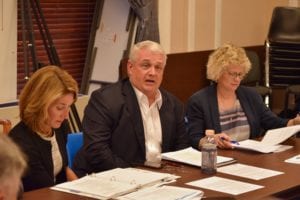Who is a member?
Our members are the local governments of Massachusetts and their elected and appointed leadership.

Administration and Finance Secretary Michael Heffernan speaks about the FY19 supplemental budget bill at the meeting of the Local Government Advisory Commission on Sept. 10. Listening are Lt. Gov. Karyn Polito (left) and Norwell Selectman and MMA President Ellen Allen (right).
With final revenue numbers in hand for last year, Gov. Charlie Baker on Sept. 6 filed a budget bill to close the books on fiscal 2019 by adding to the state’s rainy day fund, cutting state taxes, and providing additional funding for a number of school aid and local capital projects.
State tax collections exceeded estimates for the year by $1.1 billion, and Lottery revenues also beat original projections by a significant margin.
The governor’s bill (H. 4067) would add $2 million to the special education circuit breaker account, which would fully fund the state’s share of the program. The account was originally funded at $319 million based on estimates at the beginning of last year.
The bill would add $1.2 million to reimburse regional school districts for a share of student transportation expenses.
The bill did not include funding, requested by the MMA, to help close the shortfall in mitigation payments due to municipalities and school districts to lessen the impact of charter school assessments.
The governor proposed $40 million for local road projects through the Chapter 90 program and $10.5 million in added funding through the Complete Streets and Small Bridges programs.
At the May and June meetings of the Local Government Advisory Commission, municipal and school officials asked Lt. Gov. Karyn Polito to include these items in a final fiscal 2019 budget bill. The MMA will be asking the House and Senate to include these same items in the final FY19 bill that the Legislature sends back to the governor.
Last year, the closeout bill for fiscal 2018 was enacted on Oct. 23.
In response to growing concern about contamination of local drinking water supplies by chemicals known as PFAS, the governor’s bill includes $8.4 million for water supply testing and grants for treatment programs. The bill proposes a $20 million transfer to the state’s Clean Water Trust to support programs to remediate PFAS contamination and a separate $35 million transfer to the trust to increase general capacity to fund water projects.
The bill includes $4 million for the Community Compact program, through which the state helps cities and towns develop and implement best practices.
Gov. Baker proposed that $168 million be transferred to the state’s Stabilization Fund (above the $848 million previously transferred in fiscal 2019), which would bring the total to $3 billion.
The governor also proposed an immediate reduction in the state’s tax rate on personal income, from 5.05 percent to 5.0 percent, effective on Jan. 1, rather than waiting for the usual economic triggers to take effect, as expected later in the year. In addition, the bill would increase the income tax exemption for dependents from $1,000 per dependent to $2,000.